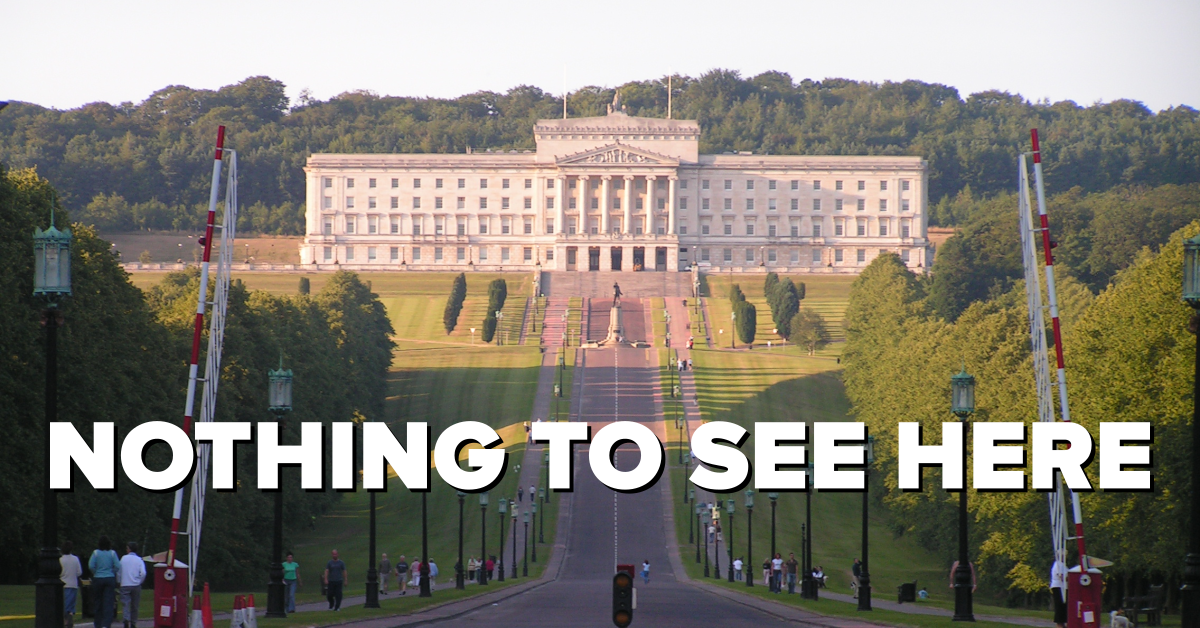


20th January 2020
After three years of suspension the Northern Ireland Assembly finally reconvened and much needed governance was restored. With the initial housekeeping of getting the Assembly ancillary structures set up the first big debate was scheduled for Monday 20th January. What was this debate about? The dire situation of our public services? No. The priorities for the The Executive’s new Programme for Government? Not that either. Instead The Executive decided to debate a motion withholding The Assembly’s consent for the Prime Minister’s Withdrawal Agreement.
Never mind the fact that such a matter is outside the competency of the devolved administrations, the debate was rendered doubly pointless by the unfortunate detail that the legislation putting this agreement into UK law had cleared the House of Commons mere hours before they decided to return from their needless 3 year sabbatical. It was gesture politics at its finest, the only problem being is that gestures are the last thing that Northern Ireland needs.
This shameless piece of political theatre though did result in a rare occurrence, total unanimity from the local political parties. The motion was carried without a division and not a single member shouting “No” when called upon. However once we dig into the rationale for each of the local parties’ objections, the newfound consensus gets slightly shaky.
The Nationalists, Sinn Fein and the SDLP, were both thoroughly against it partly due to their europhilic bent but also because in their mind Brexit, no matter the form, would ruin Northern Ireland’s economy. Quite exactly how or by what mechanism wasn’t entered into, the presumably imminent economic ruin is simply an article of faith that doesn’t require explanation. Sinn Fein were more vague in their concerns but the SDLP brought up prophecies of doom that had a distinct March 2019 vintage such as the return of a hard land border even though the agreement they’re rejecting specifically prevents that.
The Lib Dem-esque Alliance Party spoke out against it in similar terms but had a tacit acceptance that Brexit was actually happening and that the supposed damage must be mitigated. It was the same doom mongering that require no elucidation but with a hint of practicality, a more cynical person could call it triangulation.
Last but not least, the two Unionist parties also rounded on the Withdrawal Agreement. The Ulster Unionist Party condemned it in line with their most recent remain stance, having been Pro Brexit until a few months ago. Their contribution was the most ill defined of the lot but it was broadly clear that they were against it. The DUP, technically one of the few Pro Brexit parties in the Assembly, went on to condemn the agreement but made clear they thought leaving the EU was still a good idea. The crux of their objection was that the PM’s deal would result in a “Border in the Irish Sea” despite the fact that Articles 4 and 6 of the Revised Northern Ireland Protocol say otherwise. Political parties trying to rhetorically have it both ways is not an uncommon thing in Northern Ireland.
The faux outrage and fulmination went on for hours. We heard all the same lines and second hand arguments that we’ve heard the past three years. I even felt slightly nostalgic as I got to play Brexit Buzzword Bingo for the first time in a good while. In the end the motion passed and nothing was achieved apart from giving journalists something to write about on a subject the public has long stopped caring about. A political spectacle had been successfully orchestrated and a very hollow one at that.
While the assembly members got to feel important denouncing the PM and “English Nationalism” the same problems that beset Northern Ireland, that they let fester for three years, remain. The NHS waiting times remain a disgrace, the infrastructure inadequate and the education system is still segregated and unreformed. Real work needs to be done and it really can’t wait.
The general opinion of politicians may be at rock bottom in England but in Northern Ireland it’s even lower. When the assembly returned there was widespread elation but the honeymoon period didn’t even last a week as the new ministers immediately started complaining that the additional £2bn Stormont is set to receive wasn’t enough. People are greatly disillusioned and this sentiment is continually exacerbated by the actions of a political class that seems to be in another universe with priorities totally alien to their own. I saw this first hand in the General Election where a surprising number of people couldn’t even bring themselves to vote and it showed in my constituency of East Antrim that had the 4th lowest turnout in Northern Ireland.
Everyone has been waiting a long time for even the most basic semblance of a government to return. This is a time for decisive action not grandstanding, as the Secretary of State Julian Smith so succinctly put it “Let’s get on with it”.